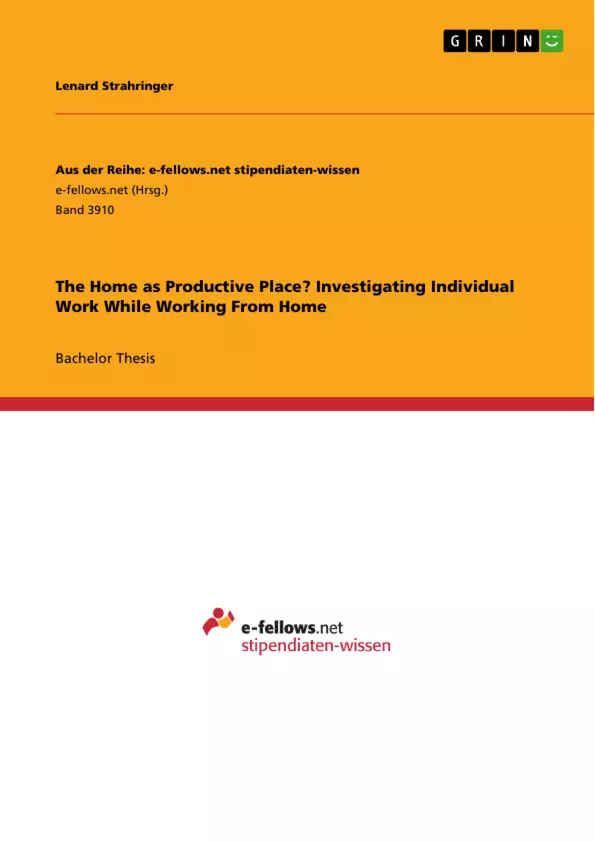The outbreak of the COVID-19 pandemic has turned the world of knowledge work to the left. Increasing the productivity of knowledge workers is a permanent challenge for organizations. It attracts attention that knowledge workers report being more productive when forced to work from home. This thesis investigates how this perceived increase in productivity might relate to the better conditions for deep individual work knowledge workers encounter in the enforced working from home setting.
Therefore, this thesis reviews the enforced working from home literature in the context of deep individual work and conducts two exploratory interviews. This thesis shows narrative evidence that knowledge workers can concentrate better in the workplace at home, prepare their tasks to be suitable for long deep individual work phases, and have the control over their schedule to arrange long interruption-free phases. Thus, knowledge workers engage in deep individual work phases of higher quality, which allows them to be more productive in terms of better work results.
Inhaltsverzeichnis (Table of Contents)
- Motivation
- Theoretical background
- Deep individual work (DIW)
- Knowledge worker productivity
- Enforced working from home (EWFH)
- Affordance theory
- Research methodology
- Literature search and review
- Interviews
- Results of the literature review
- Overview of the selected literature
- Concentration in EWFH settings
- Tasks suitable for DIW in EWFH settings
- Longer, foreseeable, interruption-free phases in EWFH settings
- DIW in EWFH settings
- Results of the interviews
- Demographics
- Concentration in EWFH settings
- Tasks suitable for DIW in EWFH settings
- Longer, foreseeable, interruption-free phases in EWFH settings
- DIW in EWFH settings
- Linking the DIW phases of higher quality to productivity
- Limitations, further research and reflection
- Conclusion
Zielsetzung und Themenschwerpunkte (Objectives and Key Themes)
This bachelor thesis examines the role of individual work while working from home, specifically focusing on the concept of deep individual work (DIW) in enforced working from home (EWFH) settings. It investigates the factors that influence the ability to engage in DIW in home environments and how these factors relate to knowledge worker productivity.
- The impact of EWFH on deep individual work (DIW)
- The role of affordances in facilitating or hindering DIW in home settings
- The relationship between DIW and knowledge worker productivity in EWFH settings
- The influence of factors like concentration, task suitability, and interruption-free phases on DIW
- The potential benefits and challenges of engaging in DIW while working from home.
Zusammenfassung der Kapitel (Chapter Summaries)
The thesis starts by defining the concept of DIW and its relevance to knowledge worker productivity, exploring the implications of EWFH on DIW. It then outlines the research methodology, encompassing a literature review and interviews with individuals working from home. The literature review analyzes existing research on DIW in EWFH settings, focusing on the factors affecting concentration, suitable tasks, and interruption-free phases. Subsequently, the thesis presents the results of the interviews, examining the experiences and perspectives of individuals regarding DIW in EWFH settings.
Schlüsselwörter (Keywords)
The key themes and concepts explored in this thesis include deep individual work (DIW), enforced working from home (EWFH), knowledge worker productivity, affordance theory, concentration, interruption-free phases, task suitability, and the challenges and benefits of DIW in home environments.
Frequently Asked Questions
What is Deep Individual Work (DIW)?
Deep Individual Work refers to phases of high concentration on cognitively demanding tasks without distractions, which is essential for knowledge worker productivity.
How does working from home affect productivity?
Research shows that knowledge workers often perceive an increase in productivity at home due to better conditions for deep work and fewer workplace interruptions.
What role does "Affordance Theory" play in this study?
Affordance theory is used to investigate how the home environment facilitates or hinders specific actions, such as long, interruption-free phases of deep work.
Why can people concentrate better at home?
The study suggests that workers have more control over their schedules and can arrange longer, foreseeable phases without the typical distractions of an office.
What are the main results of the interviews in this thesis?
The interviews provided evidence that high-quality DIW phases at home lead to better work results, directly linking the home setting to increased individual productivity.
- Quote paper
- Lenard Strahringer (Author), 2021, The Home as Productive Place? Investigating Individual Work While Working From Home, Munich, GRIN Verlag, https://www.grin.com/document/1045563



